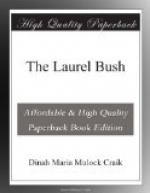After that, she was almost glad to get away, among strange people and strange places, where Robert Roy’s name had never been heard. The familiar places—hallowed as no other spot in this world, could ever be—passed out of sight, and in another week her six months’ happy life at St. Andrews had vanished, “like a dream when one awaketh.”
Had she awaked? Or was her daily, outside life to be henceforth the dream, and this the reality?
Chapter 3.
What is a “wrecked” life? One which the waves of inexorable fate have beaten to pieces, or one that, like an unseaworthy ship, is ready to go down in any waters? What most destroy us? the things we might well blame ourselves for, only we seldom do, our follies, blunders, errors, not counting actual sins? or the things for which we can blame nobody but Providence—if we dared—such as our losses and griefs, our sicknesses of body and mind, all those afflictions which we call “the visitation of God?” Ay, and so they are, but not sent in wrath, or for ultimate evil. No amount of sorrow need make any human life harmful to man or unholy before God, as a discontented, unhappy life must needs be unholy in the sight of Him who in the mysterious economy of the universe seems to have one absolute law—He wastes nothing. He modifies, transmutes, substitutes, re-applies material to new uses; but apparently by Him nothing is ever really lost, nothing thrown away.
Therefore, I incline to believe, when I hear people talking of a “wrecked” existence, that whosoever is to blame, it is not Providence.
Nobody could have applied the term to Fortune Williams, looking at her as she sat in the drawing-room window of a house at Brighton, just where the gray of the Esplanade meets the green of the Downs—a ladies’ boarding-school, where she had in her charge two pupils, left behind for the holidays, while the mistress took a few weeks’ repose. She sat watching the sea, which was very beautiful, as even the Brighton sea can be sometimes. Her eyes were soft and calm; her hands were folded on her black silk dress, her pretty little tender-looking hands, unringed, for she was still Miss Williams, still a governess.
But even at thirty-five—she had now reached that age, nay, passed it—she was not what you would call “old-maidish.” Perhaps because the motherly instinct, naturally very strong in her, had developed more and more. She was one of those governesses—the only sort who ought ever to attempt to be governesses—who really love children, ay, despite their naughtinesses and mischievousnesses and worrying ways; who feel that, after all, these little ones are “of the kingdom of heaven,” and that the task of educating them for that kingdom somehow often brings us nearer to it ourselves.
Her heart, always tender to children, had gone out to them more and more every year, especially after that fatal year when a man took it and broke it. No, not broke it, but threw it carelessly away, wounding it so sorely that it never could be quite itself again. But it was a true and warm and womanly heart still.




